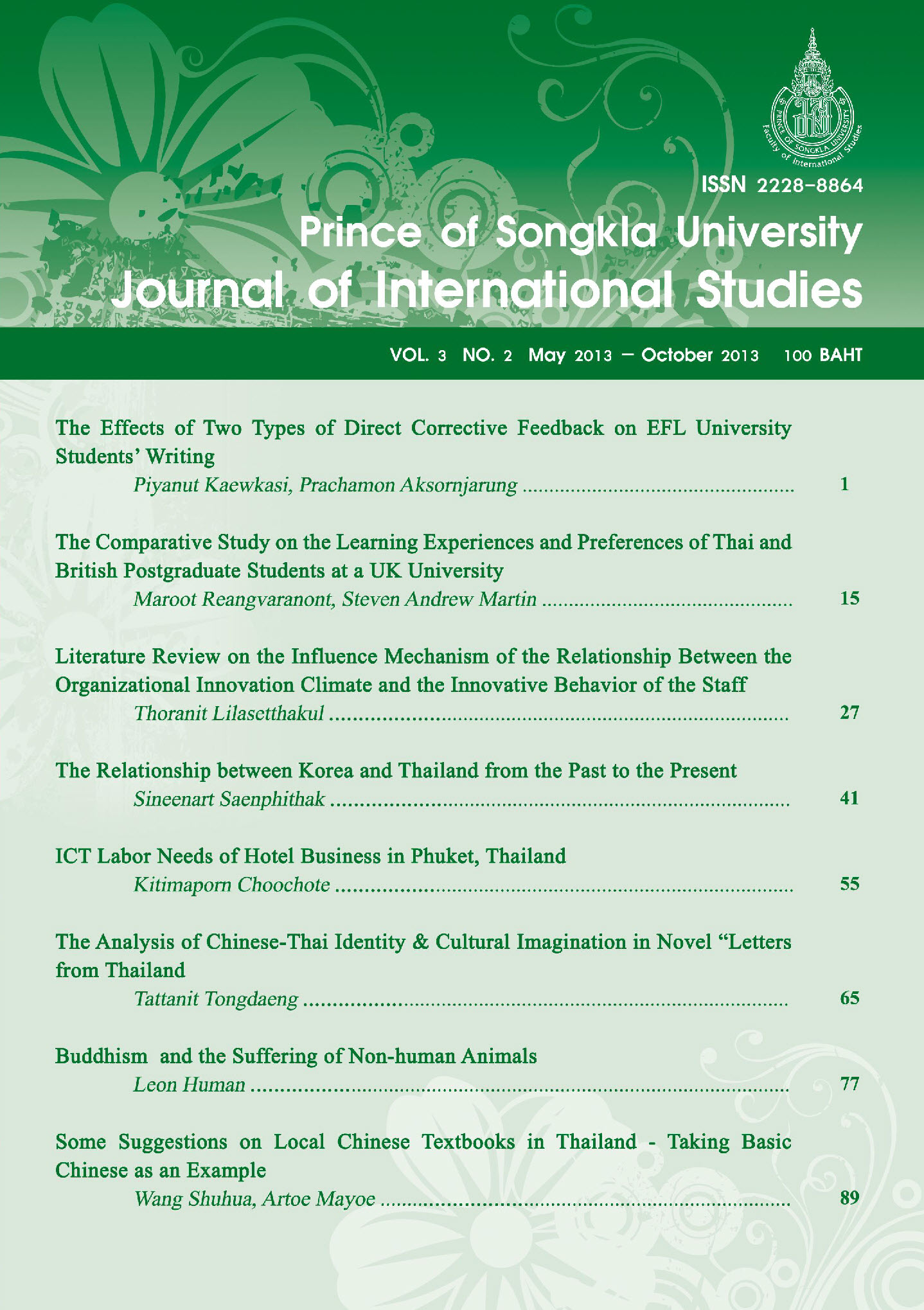A Comparative Study on the Learning Experiences and Learning Style Preferences of Thai and British Postgraduate Students at a United Kingdom University
Main Article Content
Abstract
As a consequence of globalisation, higher education in the United Kingdom has witnessed an increased demand in international education at the postgraduate level among foreign and domestic students. This research compares learning experiences and learning style preferences among Thai and British postgraduate students in the United Kingdom. Respondents included three British and three Thai Master's students who began their studies in September 2011. Data were collected through semi-structure interviews conducted in English and Thai as appropriate. The findings demonstrate that learning experiences and learning style preferences differ between British and Thai students; and the cultural background of the interviewees influenced their learning styles, preferences and
experiences at the university. Independent learning was disclosed as the most significant skill characterised by British participants, and this attribute was acquired from their educational background. In contrast, the study found that Thai participants were lacking in this area, and this was attributed to Thai culture, which values teachers as the centre of the class (i.e., a teacher-oriented classroom). Therein, Thai participants were not akin to individual learning practices and focused their attention mainly on the information presented in the classroom. As a result, preparing individual assignments were new and challenging experiences for Thai students. Implications of the study indicate the need for improved UK postgraduate provisions in order to better understand the learning styles and needs of students from the two nations included in this study. The research suggests that learning environments and students' learning styles can adapt according to the needs and preferences of universities and students alike.
Article Details
Statements and opinions expressed in articles herein are those of the authors and do not necessarily reflect the position of the editors or publisher.
Article, information, text, image, etc. which are published in Journal of International Studies, belong to Journal of International Studies. If anybody or any organization would like to use part or whole of them, they must receive written permission from Journal of International Studies before usage.
References
Bartlett, C. A. & Ghoshal, S. (2002). Managing across borders: The transnational solution. London: Century Business.
British Council. (2003). Education UK positioning for success consultation document, United Kingdom: British Council.
British Council. (2012). Benefits of UK study. Retrieved from http://www.educationuk.org/Benefits-of-UK-study (accessed 21 August 2012).
Campbell, J. J. (2011). Introduction to methods of qualitative research. Retrieved from http://www.jasonjcampbell.org/blog.php (accessed 15 May 2012).
Clark, M., Riley, M., Szivas, E., Wilkie, E. & Wood, R. (2000). Researching and writing dissertations in business and management. London: Thomson Learning.
Fisher, C. (2007). Researching and writing a dissertation. 2nd ed. Harlow: Prentice Hall.
Gaspay, A. & Legoretta, L. (2009). The impact of national culture on distance learning effectiveness. Journal of Knowledge Globalization, 2(1).
Hofstede, G. (1986). Cultural differences in teaching and learning. International Journal of Intercultural Relations, 10 (3), pp. 301-320.
Hofstede, G. (2012). National culture dimensions. Retrieved from http://geert-hofstede.com/national-culture.html (accessed 14 June 2012).
Holtbrügge, D. & Berg, N. (2004). Knowledge management in multinational corporations: Results of an empirical study among German firms. Management International Review, 44 (SI 3) pp. 129-45.
May, V. (2012). What is narrative analysis? University of Manchester course lecture, 26 April, 2012. Retrieved from http://www.youtube.com/whatisnarrativeanalysis2 (accessed 13 June 2012).
Maznevski, M. L. & Chudoba, K. M. (2000). Bridging space over time: Global virtual team dynamics and effectiveness, Organization Science, 11(5) pp. 473-492.
McKee, T. E. & Mock, E. J., 1992. A comparison of Norwegian and United States accounting students' learning style preferences. Accounting Education, 1(4) pp. 321-341.
Mullins, L. (2010). Management and organizational behavior: A critical text. 9th ed. Harlow: FT/Prentice Hall.
Patanathabutr, R. (2008). Attitudes toward teacher styles and teaching styles in an international business management program: Case study comparison. EDU-COM 2008 International Conference. Sustainability in Higher Education: Directions for Change, Edith Cowan University, Perth Western Australia, 19-21 November 2008. Khon Kaen University, Thailand.
Patton, M. Q. (2002). Qualitative Research & Evaluation Methods, 3rd ed. London: Sage Publication.
Powell, E. T. & Renner, M. (2003). Analysing Qualitative Data. Madison, Wisconsin: Cooperative Extension Publishing Operations.
Reangvaranont, M. (2012). A comparative study on the learning experiences and learning style preferences of Thai and British Postgraduate students at a UK university. Unpublished Master's thesis, Bournemouth University, Bournemouth.
Sassenburg, J. A. (2006). Research Design. Retrieved from http://disserations.ub.rug.nl/FILES/faculties/eco/2006/j.a.sassenburg/06_c2.pdf (accessed 12 June 2012).
Silverman, D. (2006). Interpreting qualitative data. 3rd ed. London: Sage Publication.
Taylor, R. L. (1990). The religious dimensions of Confucianism. Albany, NY: State University of New York Press.
UK Council of International Affairs (UKCISA). (2011). International students in highereducation: Key statistics. Retrieved from http://www.ukcisa.org.uk/about/statistics_he.php (accessed 14 June 2012).


